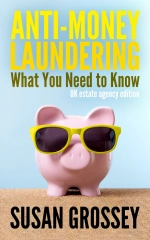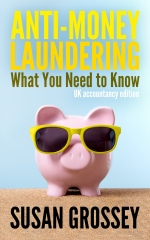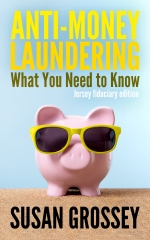If I were sitting in a mountain-top lair, twirling my moustaches and cackling evilly, I don’t think I could devise an environment more conducive to financial crime than the UK in late 2020. Put to one side the spinelessness of our government as its leaders line their pockets, promote their friends and ennoble their backers. Ignore if you will the incredulous reactions of other jurisdictions as we berate them for lack of transparency while we hobble our own beneficial ownership register. No, the topic which has given me today’s leg-up onto my high horse is freeports.
It may surprise you to learn that I am a financial simpleton. I work, I earn money, I fill in a tax return and I pay what I’m told to pay. My most thrilling financial adventure of recent months was buying some premium bonds. As a consequence, I tend to go back to basics when confronted with a financial innovation. If someone suggests to me, for instance, carving off a bit of land from a country and giving it a different financial status so that people can move stuff through that bit of land without having to comply with the law of the land to which it is attached and belongs and is governed by for all other purposes, I wonder what’s up. Sure, I can see the benefits for the importers and exporters – they’ll make more money. And they’ll like the government of the country which has carved out this special bit of land for giving them that extra money for doing nothing at all. There’ll be a few jobs in the carved-off bit, but how does it help the country beyond that? Not at all. On the contrary, I think it makes it appear suspicious in the eyes of countries that have not carved off bits of themselves and pretended that they are somehow different and exempt.
But my opinion is neither here nor there. What matters is the opinions and plans of those in charge. And recently HMG has announced its plans to “turbo-charge post-Brexit trade” through the introduction of ten freeports, some of them to be open for business by the end of 2021. This response marks the end of the consultation process, with the next step being the launch of the bidding process for potential freeports to apply for this status. It’s full steam ahead, apparently, with “a package of tax reliefs on investment by businesses within Freeport tax sites [and] new measures to speed up planning processes to accelerate development in and around Freeports”. As for concerns about “illicit activity”, apparently there was a mixed response in the consultation: “A majority of non-governmental organisations believed the risk of illicit activity in Freeports was high or very high. However, some respondents, notably port operators, felt that the risk of illicit activity was low or very low.” Well, colour me surprised.
And the government response? “The government can confirm that: (a) Freeports will have to adhere to the OECD Code of Conduct for Clean Free Trade Zones, (b) They will maintain the current obligations set out in the January 2020 Amendment to the UK’s Money Laundering Regulations 2017, and (c) As part of the authorisation process, checks will be conducted on Freeport operators and businesses operating to ensure they do not present an undue risk and that Freeport operators have adequate policies in place to ensure control over the movement of goods.”
Marvellous, sings my little AML-ish heart: the Regs will apply. But always best to check the detail, and it turns out that the reference to freeports in the amended Regs applies only to the operator of a freeport when it “stores works of art in the freeport and the value of the works of art so stored for a person, or a series of linked persons, amounts to 10,000 euros or more”. And the plan is not to limit freeport activities to artworks: the consultation document mentions fuel, alcohol, tobacco – and, in the stirring introduction, wines and olive oil. Reference is also made of “raw materials” and “hotbeds for innovation” – neither of which sounds very arty to me. In other words, there will be the lightest of light touch regulation – yet another item to be ticked on the money launderer’s shopping list when scouting for welcoming jurisdictions.





















Well said. Horrifying.
I spotted this just too late to add it to this post: https://www.rfa.org/english/news/laos/port-10072020195319.html In case anyone is still unconvinced about the lure of free ports for criminals…
Although in the interests of balance, I should point out that RUSI thinks the risks can be mitigated, in a paper released just this morning: https://www.rusi.org/publication/occasional-papers/improving-governance-and-tackling-crime-free-trade-zones
Is RUSI losing its status as an independent commentator?
I very much hope not – that would be terrifically disappointing.
That good old UK double standard – becoming more and more like the US.
As not the biggest bully in the playground can’t really adopt the full do as I say not as I do.
Getting better and better at the ‘you can’t do that’ no, I’m not doing exactly the same as you because…………………..it’s different.
* Hangs head in shame and mumbles, “But I didn’t vote for them”…*
For old times sake I checked on the latest CIA Factbook. Sure enough, the UK is still a ‘money-laundering center’.
Or, as the pedant within would have it, a ‘money laundering centre’ – but certainly right in spirit!
I think your right to be fearful. In blogs past you have highlighted (and below line we have discussed) that Brexit could lead to the UK becoming even more financial crime friendly and this just confirms how right to be worried we were.
This is typical of the terrible direction the UK is taking, transforming ourselves into an accomplice to global crime by inviting illicit funds into our economy. If this keeps up we will be home to more blood money and dirty cash than anywhere else, while still pretending we are a civilised and civilising nation! And our current government will no doubt consider such “foreign Investment” a positive win (much the same way successive governments looked on dirty money buying up most of West London as positive until the realised what social harm it was causing)
With respect to RUSI all the things they recommend are precisely the sort of oversight neither HM government or the future operators of Free ports will be interested in. Light touch (which worked so well with the financial industry) just means “barely applied”.
Yes, “light touch supervision/regulation” is definitely a euphemism! Sadly, our current government puts profit (for its own members and their cronies) above all else, so we’re probably on a hiding to nothing if we hope that they turn down this “golden” opportunity to make more money.
For those of you planning to turn your garden shed into a freeport, the UK government has published its bidding prospectus and you must apply by 5 February 2021. https://assets.publishing.service.gov.uk/government/uploads/system/uploads/attachment_data/file/935493/Freeports_Bidding_Prospectus_web_final.pdf
Glad to hear that “as part of bids, bidders are asked to set out what steps they will take to ensure that the customs sites and tax sites in their proposed Freeport will be secure against illicit activity, including organised criminal activity, money laundering, smuggling and illegal immigration”. Less reassured to know that “they will also need to maintain the current obligations set out in the UK’s Money Laundering, Terrorist Financing and Transfer of Funds (Information on the Payer) Regulations 2017”, given that we know how small are those obligations, unless the freeport is storing works of art.
Pingback: Underfunded, under-supervised and over here | I hate money laundering